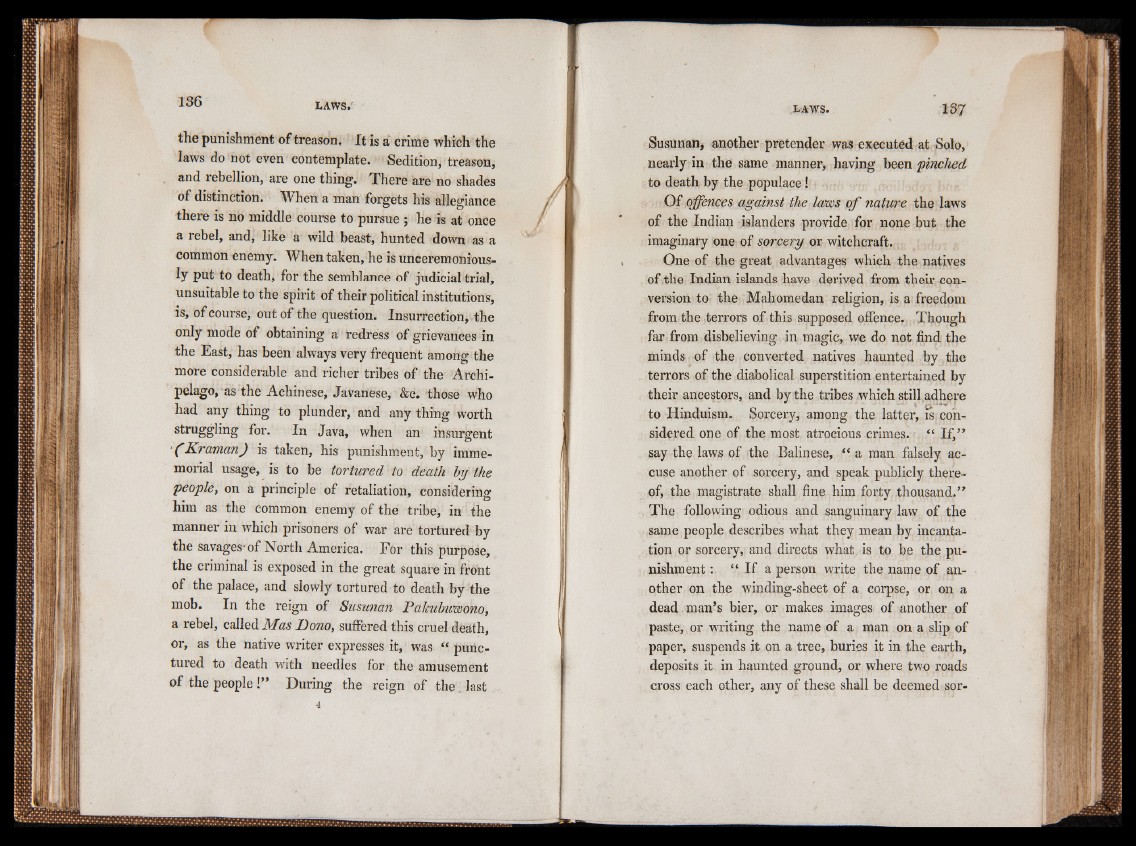
the punishment of treason, Jt is a crime which the
laws do not even contemplate. Sedition, treason,
and rebellion, are one thing. There are no shades
of distinction. When a man forgets his allegiance
there is no middle course to pursue ; he is at once
a rebel, and, like a wild beast, hunted down as a
common enemy. When taken, he is unceremoniously
put to death, for the semblance of judicial trial,
unsuitable to the spirit of their political institutions,
is, of course, out of the question. Insurrection, the
only mode of obtaining a redress of grievances in
the East, has been always very frequent among the
more considerable and richer tribes of the Archipelago,
as the Achinese, Javanese, &c. those who
had any thing to plunder, and any thing worth
struggling for. In Java, when an insurgent
' (Kraman) is taken, his punishment, by immemorial
usage, is to be tortured to death by the
people, on a principle of retaliation, considering
him as the common enemy of the tribe, in the
manner in which prisoners of war are tortured by
the savages* of North America. For this purpose,
the criminal is exposed in the great square in front
of the palace, and slowly tortured to death by the
mob. In the reign of Susunan Pakubuwono,
a rebel, called Mas Dono, suffered this cruel death,
or, as the native writer expresses it, was “ punctured
to death with needles for the amusement
of the people !” During the reign of the . last
SusUnan, another pretender was executed at Solo,
nearly in the same manner, having been pinched
to death by the populace!
Of offences against the laws of nature the laws
of the Indian islanders provide for none but the
imaginary one of sorcery or witchcraft.
One of the great advantages which the natives
of .the Indian islands have derived from their conversion
to the Mahomedan religion, is a freedom
from the terrors of this supposed offence. Though
far from disbelieving in magic, we do not find the
minds of the converted natives haunted by the
terrors of the diabolical superstition entertained by
their ancestors, and by the tribes which still adhere
to Hinduism. Sorcery, among the latter, is considered
one of the most atrocious crimes. “ If,”
say the laws of the Balinese, “ a man falsely accuse
another of sorcery, and speak publicly thereof,
the magistrate shall fine him forty thousand.”
The following odious and sanguinary law of the
same people describes what they mean by incantation
or sorcery, and directs what is to be the punishment
: “ If a person write the name of another
on the winding-sheet of a corpse, or on a
dead man’s bier, or makes images of another of
paste, or writing the name of a man on a slip of
paper, suspends it. on a tree, buries it in the earth,
deposits it in haunted ground, or where two roads
cross each other, any of these shall be deemed sor